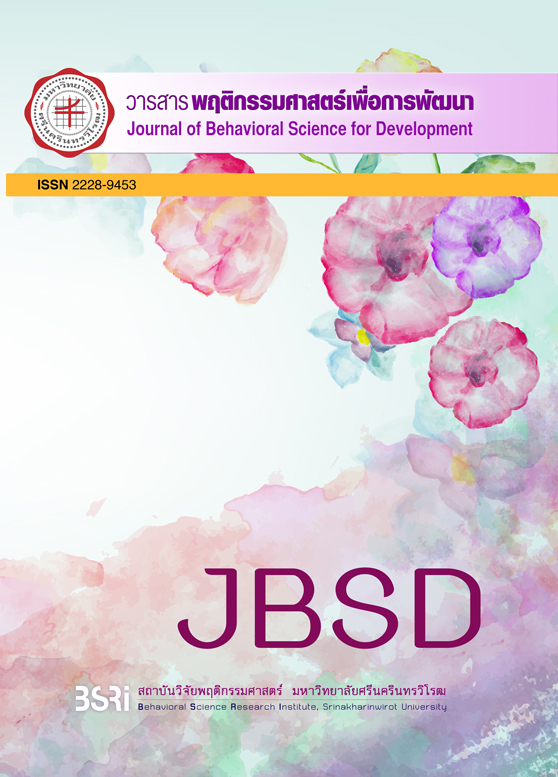Psychosocial Factors Related to Health Quotient of Health Care Providers in the Faculty of Medicine, Ramathibodi Hospital, Mahidol Universityปัจจัยทางจิตสังคมที่เกี่ยวข้องกับเชาว์สุขภาพของบุคลากรทางการแพทย์ คณะแพทยศาสตร์ โรงพยาบาลรามาธิบดี มหาวิทยาลัยมหิดล
Keywords:
Health Quotient, health behavior, self-careAbstract
This research was a comparative-correlation study with important three objectives: 1) To investigate the relationship between psychosocial factors related to health quotient. 2) Predict to Health Quotient of health care providers 3) To find the interaction between psychological characteristics and social-situational influencing responsibility Health Quotient. The samples are 300 health care providers in the Ramathibodi hospital were selected by stratified random sampling. Eight instruments in the data collection were summated rating scales. Then data were analyzed and presented by descriptive statistic, Pearson’s Product Moment Correlation, Step-Wise Multiple Regression Analysis, and two-way ANOVA. The results revealed as follows: 1) The reference modeling in health behavior, receiving health information, perceived incentives of self-care, internal locus of control, future orientation and self control, perceived self-efficacy in health behavior, attitude toward self-care were positively related to Health Quotient of health care providers (p < 0.01). 2) Perceived self-efficacy in health behavior, reference modeling in health behavior, attitude toward self-care and perceived incentives of self-care could predict 54.6% of the variance in Health Quotient of health care providers (p < 0.05). 3) There wasn’t interaction effect between situational factors and psychological traits to Health Quotient
Keywords: Health Quotient, health behavior, self-care
บทคัดย่อ
การวิจัยความสัมพันธ์เปรียบเทียบครั้งนี้ เพื่อศึกษา 1) ความสัมพันธ์ระหว่างปัจจัยทางจิตสังคมกับเชาว์สุขภาพ 2) ทำนายเชาว์สุขภาพของบุคลากรทางการแพทย์ และ 3) ปฏิสัมพันธ์ระหว่างตัวแปรกลุ่มจิตลักษณะเดิมและตัวแปรกลุ่มสถานการณ์ทางสังคมที่ส่งผลต่อเชาว์สุขภาพ ภายใต้กรอบแนวคิดทฤษฎีปฏิสัมพันธ์นิยม กลุ่มตัวอย่างใช้การสุ่มตัวอย่างแบบแบ่งชั้นเป็นบุคลากรทางการแพทย์โรงพยาบาลรามาธิบดี จำนวน 300 คน เครื่องมือที่ใช้เป็นแบบมาตรวัดประเมินรวมค่า 6 ระดับ สถิติที่ใช้ในการวิเคราะห์ข้อมูล คือ สถิติพรรณนา สัมประสิทธิ์สหสัมพันธ์ของเพียร์สัน การวิเคราะห์สัมประสิทธิ์ถดถอยพหุคูณแบบเพิ่มตัวแปรทีละขั้น และการวิเคราะห์ความแปรปรวนแบบสองทาง ผลการวิจัยพบว่า 1) การรับรู้ความสามารถของตนด้านสุขภาพ การมีตัวแบบทางสุขภาพจากบุคคลอ้างอิง การได้รับสิ่งจูงใจในการดูแลสุขภาพ เจตคติต่อการดูแลสุขภาพ การได้รับข่าวสารทางสุขภาพ ความเชื่ออำนาจภายในตน และลักษณะมุ่งอนาคตควบคุมตนมีความสัมพันธ์กันทางบวก (r = .197 - .644) กับเชาว์สุขภาพของบุคลากรทางการแพทย์ (p < 0.01) 2) การรับรู้ความสามารถของตนด้านสุขภาพ การมีตัวแบบทางสุขภาพจากบุคคลอ้างอิง เจตคติต่อการดูแลสุขภาพ และการได้รับสิ่งสูงใจในการดูแลสุขภาพ สามารถทำนายเชาว์สุขภาพของบุคลากรทางการแพทย์ได้ร้อยละ 54.6 (p < 0.05) 3) ไม่พบปฏิสัมพันธ์ระหว่างปัจจัยสถานการณ์ทางสังคมกับจิตลักษณะเดิมที่มีต่อเชาว์สุขภาพ
คำสำคัญ: เชาว์สุขภาพ, พฤติกรรมสุขภาพ, การดูแลตนเอง



